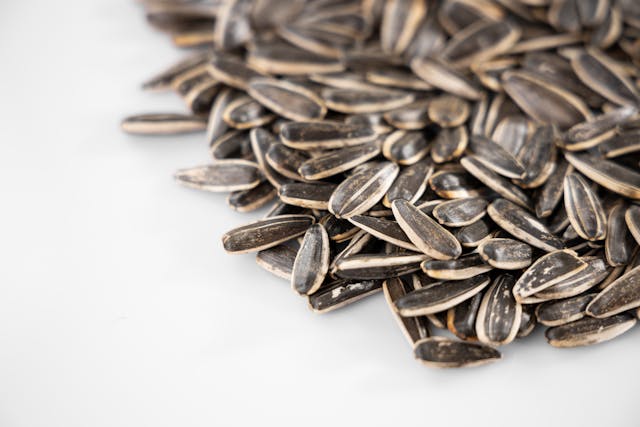Feel free to share!
Table of Contents 👈 Tap Here
Sunflower seeds are small but mighty nutritional powerhouses packed with essential vitamins, minerals, and antioxidants. Whether you consume them as a snack, sprinkle them on meals, or add them to smoothies, sunflower seeds offer a versatile and tasty way to improve your health. In this guide, we explore the ten most powerful health benefits of sunflower seeds, how to incorporate them into your diet, and tips for overcoming any common concerns.

1. Rich in Nutrients and Antioxidants
Sunflower seeds are loaded with essential nutrients that contribute to your overall health. They are an excellent source of vitamin E, an antioxidant that helps combat oxidative stress and protect cells from damage. Additionally, sunflower seeds provide magnesium, zinc, copper, and healthy fats, including monounsaturated and polyunsaturated fats, which support heart health and provide energy.
Antioxidants in Sunflower Seeds: The antioxidants in sunflower seeds, including phenolic acids and flavonoids, help reduce the risk of chronic diseases like heart disease and diabetes. Consuming sunflower seeds regularly can aid in neutralizing free radicals and protecting your body from cellular damage.
Tip: To retain the full antioxidant power, opt for raw or lightly roasted sunflower seeds. Avoid heavily processed versions that may lose some of their beneficial properties.
2. Supports Heart Health
Sunflower seeds are heart-healthy, thanks to their high content of healthy fats. These fats help reduce bad cholesterol (LDL) while increasing good cholesterol (HDL). Additionally, sunflower seeds are rich in magnesium, which helps regulate blood pressure and supports cardiovascular health.
Omega-6 Fatty Acids and Heart Health: Sunflower seeds are an excellent source of omega-6 fatty acids, which have anti-inflammatory properties that help lower heart disease risk. These essential fatty acids can improve blood vessel function and reduce the risk of hypertension.
Tip: To boost heart health, sprinkle sunflower seeds on salads or mix them into yogurt. For an even healthier snack, pair them with omega-3-rich foods like walnuts or flaxseeds.
3. Boosts Immunity
Sunflower seeds can help strengthen your immune system due to their high levels of vitamin E and selenium. Vitamin E is an antioxidant that helps protect cells, while selenium supports the production of immune cells, allowing your body to defend against infections more effectively.
Vitamin E and Immune Support: The vitamin E found in sunflower seeds plays a crucial role in maintaining immune function. The selenium content further supports immune health and enhances your body’s response to vaccines.
Tip: Incorporate sunflower seeds into your diet during cold and flu season for an immune-boosting boost. Add them to soups, salads, or oatmeal to support your body’s defenses.
4. Supports Weight Management
Despite their high calorie content, sunflower seeds can aid in weight management. These seeds are rich in protein and fiber, which help you feel full and satisfied, reducing the likelihood of overeating.
Appetite Control with Sunflower Seeds: Sunflower seeds can stabilize blood sugar levels, helping to control hunger and prevent energy crashes. Their healthy fats, protein, and fiber work together to support fat-burning processes in the body, making them a great addition to a balanced diet.
Tip: Snack on a handful of sunflower seeds between meals to curb hunger and maintain energy levels throughout the day.
5. Improves Skin and Hair Health
Sunflower seeds are a natural beauty booster, thanks to their high vitamin E and essential fatty acids. These nutrients help protect skin from oxidative stress, reduce inflammation, and promote healthier, more radiant skin.
Sunflower Seeds for Skin: The antioxidants in sunflower seeds fight free radicals that contribute to premature aging and skin damage. Regular consumption can improve skin elasticity, reduce acne, and provide a youthful glow.
Sunflower Seeds for Hair: The healthy fats in sunflower seeds also benefit your scalp, promoting healthier hair growth by nourishing hair follicles and preventing hair loss.
Tip: Apply sunflower seed oil to your skin as a natural moisturizer, or massage it into your scalp to nourish your hair and reduce dryness.
6. Aids Digestion and Gut Health
Sunflower seeds are an excellent source of dietary fiber, which supports healthy digestion. Fiber helps prevent constipation, promotes regular bowel movements, and acts as a prebiotic, feeding beneficial gut bacteria.
Gut Health and Prebiotics in Sunflower Seeds: A healthy gut microbiome is essential for overall wellness. The prebiotics in sunflower seeds help nourish beneficial bacteria like Bifidobacteria, which promotes better digestion and supports a healthy immune system.
Tip: For optimal digestion, soak sunflower seeds overnight before eating them. This enhances nutrient absorption and reduces phytic acid, which can interfere with mineral absorption.
7. Supports Brain Function
Magnesium and vitamin B6 in sunflower seeds play vital roles in brain health. Magnesium helps regulate neurotransmitters, while vitamin B6 supports the production of serotonin, a hormone that helps improve mood and reduce stress.
Brain-Boosting Nutrients in Sunflower Seeds: The magnesium in sunflower seeds helps improve cognitive function and reduce anxiety, while vitamin B6 contributes to mood regulation and enhanced focus.
Tip: Enjoy a handful of sunflower seeds before studying or tackling a stressful task to boost focus and maintain a calm, clear mind.
8. Helps Regulate Blood Sugar Levels
Sunflower seeds are a great option for people with diabetes or anyone looking to regulate blood sugar levels. They have a low glycemic index, meaning they don’t cause blood sugar spikes and can help stabilize glucose levels.
Blood Sugar Control with Sunflower Seeds: The fiber and protein in sunflower seeds slow the absorption of sugar, making them an excellent choice for people managing their blood sugar levels. Consuming sunflower seeds regularly can help improve insulin sensitivity.
Tip: Replace sugary snacks with sunflower seeds to prevent blood sugar fluctuations and maintain steady energy throughout the day.
9. Strengthens Bones
Sunflower seeds contain magnesium, calcium, and phosphorus, essential nutrients for maintaining healthy bones. These nutrients help regulate calcium absorption, ensuring your bones stay strong and resilient.
Bone Health and Sunflower Seeds: Magnesium plays a vital role in bone density, working with calcium and phosphorus to support healthy bone structure and prevent osteoporosis.
Tip: Combine sunflower seeds with leafy greens or dairy to maximize calcium absorption and promote strong, healthy bones.
10. Reduces Inflammation
Numerous medical conditions, such as heart disease and arthritis, are associated with chronic inflammation. Sunflower seeds have natural anti-inflammatory properties, thanks to their high vitamin E and omega-6 fatty acid content.
Fighting Inflammation with Sunflower Seeds: The antioxidants and omega-6 fatty acids in sunflower seeds help reduce inflammation in the body, lowering the risk of chronic diseases and improving overall health.
Tip: Incorporate sunflower seeds into your anti-inflammatory diet, along with foods like turmeric and ginger, to help combat inflammation and promote better health.
Sunflower Seeds Consumption Timetable
Sunflower Seed Consumption Timetable
| Time of Day | Meal/Snack | How to Include Sunflower Seeds |
|---|---|---|
| Morning (7:00 – 8:00 AM) | Breakfast | Add 1/4 cup of sunflower seeds to oatmeal, yogurt, or a smoothie for an energy boost. |
| Mid-Morning (10:00 – 11:00 AM) | Snack | Eat a handful of sunflower seeds (raw or lightly roasted) to curb hunger and keep energy levels stable. |
| Lunch (12:30 – 1:30 PM) | Main Meal | Sprinkle sunflower seeds over a salad, soup, or stir-fry for extra crunch and nutrients. |
| Afternoon (3:00 – 4:00 PM) | Healthy Snack | Mix sunflower seeds with dried fruits and nuts for a homemade trail mix to beat afternoon cravings. |
| Evening (6:30 – 7:30 PM) | Dinner | Use sunflower seeds as a garnish for grilled vegetables, pasta, or rice dishes. |
| Night (8:30 – 9:00 PM) | Light Snack (Optional) | Blend sunflower seeds into a smoothie or sprinkle them on a fruit salad to promote better sleep. |
Additional Tips:
Drink plenty of water to aid digestion when consuming sunflower seeds.
Moderation is key—stick to around 1/4 cup (30 grams) per day to avoid excessive calorie intake.
Opt for unsalted and raw sunflower seeds to maximize health benefits.
For maximum benefit, consider including sunflower seeds in your daily routine.
Morning: Add sunflower seeds to oatmeal or blend them into smoothies for a nutritious start to the day.
Mid-Morning Snack: Enjoy a handful of raw sunflower seeds for a quick and satisfying energy boost.
Lunch: Toss sunflower seeds into salads or soups for added texture and nutrients.
Afternoon Snack: Mix sunflower seeds with yogurt or cottage cheese for a protein-packed snack.
Dinner: Use sunflower seed butter as a spread or add sunflower seeds to stir-fried vegetables for extra crunch.
Before Bed: Enjoy sunflower seed tea or a small serving of seeds as a relaxing nighttime snack.
Common Problems and Solutions When Eating Sunflower Seeds
High Caloric Content
Problem: Sunflower seeds are calorie-dense, and excessive consumption may lead to weight gain.
Solution: Stick to recommended portion sizes (a handful) and balance your intake with physical activity.
Digestive Issues
Problem: Some individuals may experience bloating or constipation due to the fiber content.
Solution: Drink plenty of water and gradually introduce sunflower seeds into your diet to allow your body to adjust.
Allergies and Sensitivities
Problem: People with sunflower seed allergies may experience symptoms like itching or swelling.
Solution: Avoid sunflower seeds if allergic and consult a doctor for alternative nutrient sources.
Excess Salt Intake
Problem: Many sunflower seeds available in stores are heavily salted.
Solution: Choose unsalted or lightly salted sunflower seeds to reduce sodium intake.
Rancidity and Storage Issues
Problem: Sunflower seeds contain oils that can go rancid if stored improperly.
Solution: Store sunflower seeds in an airtight container in a cool, dry place, or refrigerate them for longer freshness.
Sunflower seeds are a nutrient-packed superfood that provides a wide range of health benefits, from supporting heart health to improving skin, hair, and bone strength. Incorporating sunflower seeds into your daily diet is a simple way to boost overall health. So, start adding sunflower seeds to your meals and enjoy their many benefits today!
FAQs on Sunflower Seeds:
Are Sunflower Seeds: healthy?
Yes, Sunflower Seeds: are rich in healthy fats, protein, fiber, and essential vitamins like vitamin E and B-complex.
Can you eat Sunflower Seeds: raw?
Yes, Sunflower Seeds: can be eaten raw, roasted, or even sprouted for added nutrition.
How do you roast Sunflower Seeds:?
To roast Sunflower Seeds:, bake them in an oven at 300°F (150°C) for 10–15 minutes with a bit of salt or seasoning.
Are Sunflower Seeds: good for weight loss?
Sunflower Seeds: can be a healthy snack for weight loss as they are high in fiber and protein, helping with satiety.
Are Sunflower Seeds: good for heart health?
Yes, Sunflower Seeds: contain unsaturated fats, magnesium, and antioxidants that promote heart health.
Can Sunflower Seeds: be used for hair growth?
Yes, Sunflower Seeds: are rich in vitamin E and biotin, which can support hair growth and scalp health.
How long do Sunflower Seeds: last?
Sunflower Seeds: can stay fresh for several months when stored in an airtight container in a cool, dry place.
Are Sunflower Seeds: safe for pets?
Sunflower Seeds: are generally safe for birds but should be given in moderation to other pets like dogs and hamsters.
Do Sunflower Seeds: need to be soaked before eating?
Soaking Sunflower Seeds: can enhance their digestibility and nutrient absorption but is not necessary.
